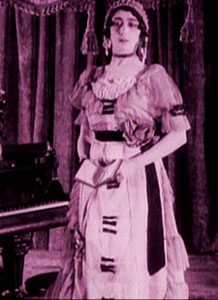SPOILERS!
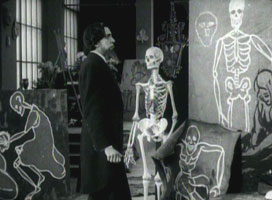 A prettily gloomy & mystical film, The Dying Swan (Umirayuschii Lebed, 1916) is a work of art passed down to us from Russia's silent film era.
A prettily gloomy & mystical film, The Dying Swan (Umirayuschii Lebed, 1916) is a work of art passed down to us from Russia's silent film era.
Gizella (Vera Karalli), a mute dancer, is courted by a young gentleman, Victor (Vitold Polonsky).
They spend romantic days together & she's deliriously happy. Alas the idyll is all too soon destroyed when she discovers her gentleman embracing & kissing another woman.
She must for emotion's sake leave her home to be away from the heartache. So she joins a ballet troupe.
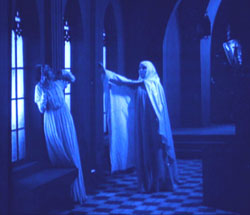 Her travels bring her in contact with a melancholy Count (Andrej Gromov), an artist who pursues, in his paintings, the mysteries of Death. Her travels bring her in contact with a melancholy Count (Andrej Gromov), an artist who pursues, in his paintings, the mysteries of Death.
Her fame for dancing "The Dying Swan" spreads throughout Russia. Through her the Count hopes to unlock mysteries, if only he can paint her dance of the swan at the moment of death.
He is in awe of Gizella's mute condition, seeing in her silence an echo of that "perfect peace" which is reserved to the dead.
With director Evegnii Bauer's love of creating visions on the screen, Gizella Rocco has a fiercely ominous dream, in which she follows a ghostly nun to the place of the nun's cruel death.
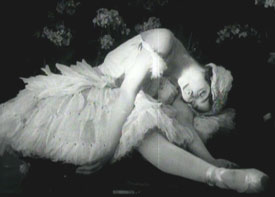 Arms reach from all directions to tear at her, an image borrowed by Cocteau for Beauty & the Beast (Le Belle et la bete, 1946). Arms reach from all directions to tear at her, an image borrowed by Cocteau for Beauty & the Beast (Le Belle et la bete, 1946).
She's unexpectedly sought anew by her first & unfaithful beau Viktor. For Gizella it is like a dream. She is all forgiving, & they are soon engaged.
To the Count, however, it is the destruction of his own ideal. For now, when he gazes on his model's new happiness, she is no longer the embodiment of that dying swan.
He feels forsaken of her dark joyless expression. He's horrified by her sunny disposition. He can only finish his painting if she is dead!
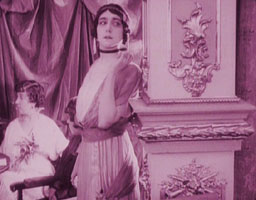 Evgenii Bauer had earlier directed After Death (Posle smert, 1915), based on a work of Ivan Turgenev, & featuring the woman who played the mute dancer Gizelle, Vera Karalli as Zoya. Evgenii Bauer had earlier directed After Death (Posle smert, 1915), based on a work of Ivan Turgenev, & featuring the woman who played the mute dancer Gizelle, Vera Karalli as Zoya.
Andrei (Vitold Polonsky) is a monkish scholar. He has no life beyond his books, unless it is his memories of his dead mother.
A university friend forces him to visit Princess Tarskaya (Marfa Kassatskaya), who is having a soiree. Here for the first time in his life Andrei is smitten, his heart held captive by the actress Zoya Kadmina.
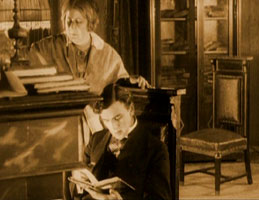 He sees her a second time at a small recital, but from his own neurotic nature evades the chance of an introduction. He sees her a second time at a small recital, but from his own neurotic nature evades the chance of an introduction.
So Zoya herself boldly arranges a tryst in the snowy park, although she flees from the sight of Andrei, her purpose unrevealed.
Three months pass in Andrei's secluded life with his old aunt (Olga Rakhmanova). Then one day he sees by the newspapers that Zoya commited suicide by poison.
She appears to him in his reveries & in his dreams. Whether she is a tarue revenant or his lonesome imagination, none may judge.
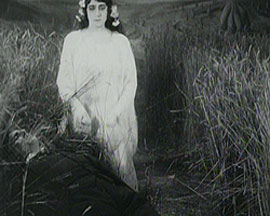 In a flashback we are witness to a wonderfully hammy & protracted death scene. The scholar obsesses on her memory & soon receives from Zoya's mother (Mariya Khalatova) the diary of her dead daughter. In a flashback we are witness to a wonderfully hammy & protracted death scene. The scholar obsesses on her memory & soon receives from Zoya's mother (Mariya Khalatova) the diary of her dead daughter.
Andrei immerses himself in the melancholic manner in the diary, discovering also his never-guessed contribution to her demise.
They meet one another in a meadow within his dream, a simple, sukrreal, deathly encounter. Upon waking, he is filled with unease.
He seems increasingly to be haunted, if not merely mad with grief. His old aunty begins to worry for his health. With each encounter with the beloved ghost, he is increasingly wan, & lives with constant, worried expectation.
There is eventually evidence that the ghostly manifestations are not mere matters of his own afflictted mind, as Andrei comes closer & closer to his own inevitable doom.
copyright © by Paghat the Ratgirl
|
